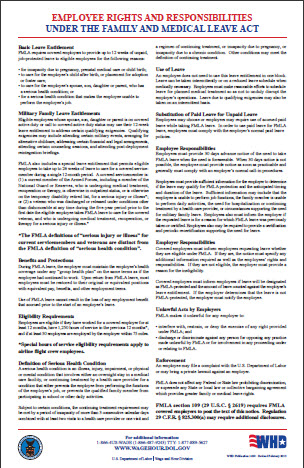By Mark B. Wiletsky
Employers will likely face additional requests by employees seeking leave under the Family and Medical Leave Act (FMLA) to care for an adult child who is unable to care for themselves. The Department of Labor (DOL) recently issued an Administrator’s Interpretation (AI), No. 2013-1, clarifying the definition of “son or daughter” under the FMLA as it relates to covered leave for an adult child with a serious health condition. The AI also clarified FMLA leave to care for an adult child injured during military service. Let’s take a look at what employers need to know.
FMLA Leave for Care of a Son or Daughter
The FMLA provides an eligible employee with up to 12 weeks of unpaid, job-protected leave during a 12-month period to care for a son or daughter with a serious health condition. If the child is age 17 or younger, the employee requesting leave need only show that the child has a serious health condition and the employee is needed to care for the child. However, if the child is age 18 or older, leave is available only if the child has a mental or physical disability and is incapable of self-care because of that disability.
Four-part Test to Determine FMLA Leave for an Adult Child with a Disability
To determine whether a parent is entitled to take FMLA leave to care for their adult (age 18 or older) child, four criteria must be met. The adult son or daughter must:
1) have a disability as defined by the Americans with Disabilities Act (ADA);
2) be incapable of self-care due to that disability;
3) have a serious health condition; and
4) be in need of care due to the serious health condition.
Disability Determination. Because the FMLA regulations rely on the definition of disability found in the ADA, the first criteria will be met if the adult child has a physical or mental impairment that substantially limits one or more of their major life activities. Because the Americans with Disabilities Act Amendments Act of 2008 (ADAAA) expanded the definition of major life activities that lead to a disability determination, the issue of disability is not likely to require an extensive analysis.
Incapable of Self-Care. The second criteria specifies that the adult child must require active assistance or supervision to provide daily self-care in three or more of the “activities of daily living” or “instrumental activities of daily living.” In essence, this means that the individual needs help with daily activities such as bathing, grooming, dressing, eating, cooking, cleaning, shopping, maintaining their home, using a telephone, etc. Determining whether an adult child is incapable of self-care due to their disability is a fact-specific analysis that must be made based on their condition at the time of the requested leave.
FMLA Serious Health Condition. If the adult child meets the first two criteria in the test, the analysis turns to whether the child has a serious health condition, as defined by the FMLA. This means the individual has an illness, injury, impairment or physical or mental condition that involves inpatient care or continuing treatment by a health care provider. In many cases, the impairments that meet the definition of disability under the ADAAA will also meet the definition of serious health condition under the FMLA. However, it is important to note that the serious health condition does not have to be associated with the individual’s disability (e.g., a broken leg may be the serious health condition for an individual whose disability is cancer).
Care Needed. Finally, the parent requesting leave must be needed to care for the adult child with a serious health condition. This threshold is relatively low as the term “needed to care” can include providing transportation for doctor appointments, preparing food and offering psychological comfort and reassurance.
Age at Onset of Disability Doesn’t Matter
An important clarification made by the DOL is that the disability of the child does not have to have occurred or been diagnosed before the child turned 18 years old. For purposes of FMLA leave, it does not matter when the disability commenced. The DOL believes this interpretation is consistent with the legislative history and purpose of the FMLA.
Caring for Adult Children Injured During Military Service
Under the FMLA military caregiver provision, the parent of a covered servicemember who incurred a serious injury or illness during military service may take up to 26 weeks of FMLA leave in a single 12-month period. Recognizing that the impact of the injury may extend beyond a single 12-month period, the DOL clarified that the servicemember’s parent may take FMLA leave to care for a son or daughter in subsequent years due to the adult child’s serious health condition, provided all other FMLA requirements are met.
What Do I Do Now?
With the potential influx of new FMLA leave requests related to the care of an adult child, review your FMLA policies and procedures now to ensure that they are consistent with the new DOL guidance. Train your human resource professionals and any supervisors who handle leave requests to recognize the issues associated with leave for the care of an adult child. And finally, given the complexities involved in this four-part test, consult with your legal counsel when faced with a leave request to care for an adult child.
 Have you updated your Family and Medical Leave Act (FMLA) policy and poster? You should have. New regulations that implement changes to the FMLA went into effect on March 8, 2013. Covered employers need to take action now to ensure compliance with the new rules.
Have you updated your Family and Medical Leave Act (FMLA) policy and poster? You should have. New regulations that implement changes to the FMLA went into effect on March 8, 2013. Covered employers need to take action now to ensure compliance with the new rules. 
